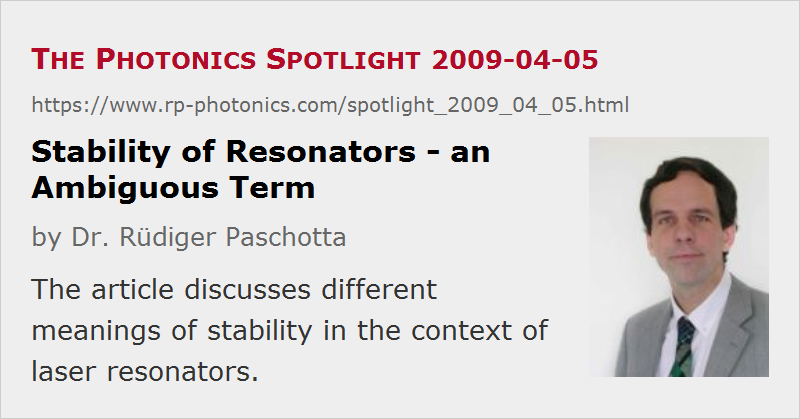Stability of Resonators – an Ambiguous Term
Posted on 2009-04-05 as a part of the Photonics Spotlight (available as e-mail newsletter!)
Permanent link: https://www.rp-photonics.com/spotlight_2009_04_05.html
Author: Dr. Rüdiger Paschotta, RP Photonics Consulting GmbH
Abstract: The article discusses different meanings of stability in the context of laser resonators.

Ref.: encyclopedia articles on optical resonators, laser resonators, stability zones, alignment sensitivity of optical resonators; The Photonics Spotlight 2006-11-28
In the context of optical resonators, stability is a property with very different meanings:
- Generally, stability of some device is usually understood to be something like a low sensitivity to uncontrolled external influences. For example, an industrial laser should have a laser resonator which is not easily misaligned by vibrations or temperature changes.
- For optical resonators, however, there is also an entirely different meaning of the word stability. Originally, this came from considering a ray circulating in the resonator: the resonator is called stable essentially when any ray injected with some initial transverse offset position and angle will stay within the resonator during many round trips. When some resonator property (e.g. an arm length of the focusing power of some lens) is continuously varied, there are certain zones in which the resonator is stable in that sense (→ stability zones). A resonator has modes both in stable and unstable regions, but their properties are much more complicated in unstable regions.
The trouble is that these kinds of stability are extremely different:
- A laser resonator may exhibit a diverging alignment sensitivity at the edge of a stability zone. Even a bit within that zone, the laser can be highly sensitivity to the slightest misalignment, and in fact also to other effects such as aberrations of a thermal lens. Therefore, even uttermost mechanical stability may not be sufficient to get a robust laser.
- There are lasers with unstable resonators which are very stable in the common sense and can thus serve as industrial lasers.
In some cases, the requirements for stability in both senses can even be conflicting. In particular, Q-switched solid-state lasers are mechanically most stable when built with a very compact (possibly even monolithic) resonator setup. This, however, together with the requirement of having a sufficiently large effective mode area on all optical components (the laser crystal, the Q-switch, dielectric mirrors) may force one to operate the laser near such an sensitive stability edge. That can be a severe problem, making it very hard to obtain a robust setup, despite the good mechanical stability.
Obviously, it is essential in such situations to understand very well the involved trade-offs in order to find the overall best technical solution.
This article is a posting of the Photonics Spotlight, authored by Dr. Rüdiger Paschotta. You may link to this page and cite it, because its location is permanent. See also the RP Photonics Encyclopedia.
Note that you can also receive the articles in the form of a newsletter or with an RSS feed.
Questions and Comments from Users
Here you can submit questions and comments. As far as they get accepted by the author, they will appear above this paragraph together with the author’s answer. The author will decide on acceptance based on certain criteria. Essentially, the issue must be of sufficiently broad interest.
Please do not enter personal data here; we would otherwise delete it soon. (See also our privacy declaration.) If you wish to receive personal feedback or consultancy from the author, please contact him e.g. via e-mail.
By submitting the information, you give your consent to the potential publication of your inputs on our website according to our rules. (If you later retract your consent, we will delete those inputs.) As your inputs are first reviewed by the author, they may be published with some delay.
 |




If you like this page, please share the link with your friends and colleagues, e.g. via social media:
These sharing buttons are implemented in a privacy-friendly way!